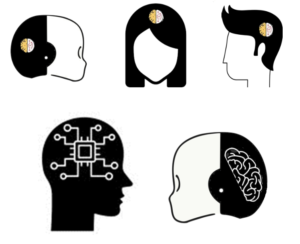Cognitive Robotics for Interaction
Workshop proposal for ROMAN 2020
Humans can easily collaborate with others, thanks to their capacity of understanding other agents and anticipate their actions. This possibility is given by the fact that humans are cognitive agents who combine sensory perception with internal models of the environment and people, and that they perceive other humans with the same features: this enables mutual understanding and coordination.
Robots, in order to be able to interact with humans in an efficient and natural way, needs to have a cognitive architectures as well. On the other side, robots are an ideal stimulus to understand which are the basic skills that have to be implemented on the robot necessary to make it be perceived as a cognitive agent and to make natural human-robot interaction possible.
The implementation of cognitive architectures on robots could validate cognitive theories or give cognitive scientists inputs for new questions to investigate, while the results about human behavior during human-robot interaction studies could give robotics engineers new hints for developing more socially intelligent robots.
The goal of the workshop will be to provide a venue for researchers interested in the study of HRI from a cognitive perspective. It will be an ideal venue to discuss about the open challenges in developing cognitive architectures for HRI, such as anticipation, adaptation (both emotional and motoric), dyadic and group interaction, the human inspiration and the technological implementation of cognitive architectures by means of, among others, computer vision and machine learning techniques.
Organizers
Alessandra Sciutti received her Ph.D. in Humanoid Technologies from the University of Genova (Italy) in 2010. After a Post Doc at the Italian Institute of Technology (IIT) and two research periods in USA and Japan, she is now Tenure Track Researcher, head of the CONTACT (COgNiTive Architecture for Collaborative Technologies) unit of IIT. In 2018 she has been awarded the ERC Starting Grant wHiSPER (www.whisperproject.eu), focused on the investigation of joint perception between humans and robots. The scientific aim of her research is to investigate the sensory and motor mechanisms underlying mutual understanding in human-human and human-robot interaction. More information at: https://www.iit.it/people/alessandra-sciutti
Serena Ivaldi is a tenured research scientist in INRIA Nancy Grand-Est (France), working in the project-team LARSEN. Before joining Inria, she was a postdoc in the Intelligent Autonomous Systems Lab of TU Darmstadt (Germany), and in the Institute of Intelligent Systems and Robotics (ISIR) in Paris (France). She did her PhD at the Italian Institute of Technology in Genoa (Italy). Her research is currently focused on robots collaborating with humans. She is interested in combining machine learning with control to improve the prediction and interaction skills of robots. She is currently PI in the EU H2020 ICT project AnDy (2017-2020), where they focus on collaboration between humans and humanoids, exoskeletons and cobots, and in the EU Chist-Era project HEAP (2019-2022), where they combine machine learning techniques and human-in-the-loop approach to grasp irregular objects in a heap. More information at: https://members.loria.fr/SIvaldi/
Katrin Solveig Lohan joined the school of Mathematical and Computer Sciences at Heriot-Watt University as a Lecturer in 2013. She is deputy director of the Robotics Lab. Previously, she was working at the Istituto Italiano di Tecnologia (IIT), as a junior Post Doc in the RobotDoc project founded by the Marie Curie Fellowship. She obtained her Ph.D. in Engineering from Bielefeld University, Germany in 2012, where she was associated with the ITALK Project as Ph.D. student. Her main research interests are in understanding the learning mechanisms between parents and infant, between adults and adults, and between humans and robots in order to create a natural interaction with a robot. More information at: http://www.macs.hw.ac.uk/~kl360/
Giovanna Varni is an Associate Professor at LTCI, Télécom Paris, Institut polytechnique de Paris,France. Previously, she was post doc at the Institute for Intelligent Systems and Robotics (ISIR), Pierre et Marie Curie University, (Paris, France), and at InfoMus Lab, DIBRIS, Università degli Studi di Genova (Genova, Italy). She received her PhD from the Università degli Studi di Genova (Genova, Italy). She is an interdisciplinary researcher mainly investigating on Social Signal Processing (SSP) and Human Computer Interaction. She was involved in several EU FP7-FP6 projects and she is currently PI of the national French project ANR JCJC GRACE (2019-2022) on the automated analysis of cohesion in small groups of humans. More information at: https://sites.google.com/site/gvarnisite/
Alessia Vignolo is a Post Doc at the CONTACT unit at IIT. She received her International Ph.D. in Cognitive Robotics, Interaction and Rehabilitation Technologies from the University of Genoa (Italy) in 2018. She was a Post Doc for the University of Warwick for the ERC project “The Sense of Commitment” under the supervision of John Michael, while she was affiliated to IIT working at the Robotics, Brain and Cognitive Sciences Department. Her main research interests are in making robots able to understand humans by using visual cues and, on the other side, in investigating how humans’ behavior is influenced by perceiving different robots’ stimuli visually, with a particular focus on movements in both cases. More information at: https://www.iit.it/people/alessia-vignolo
